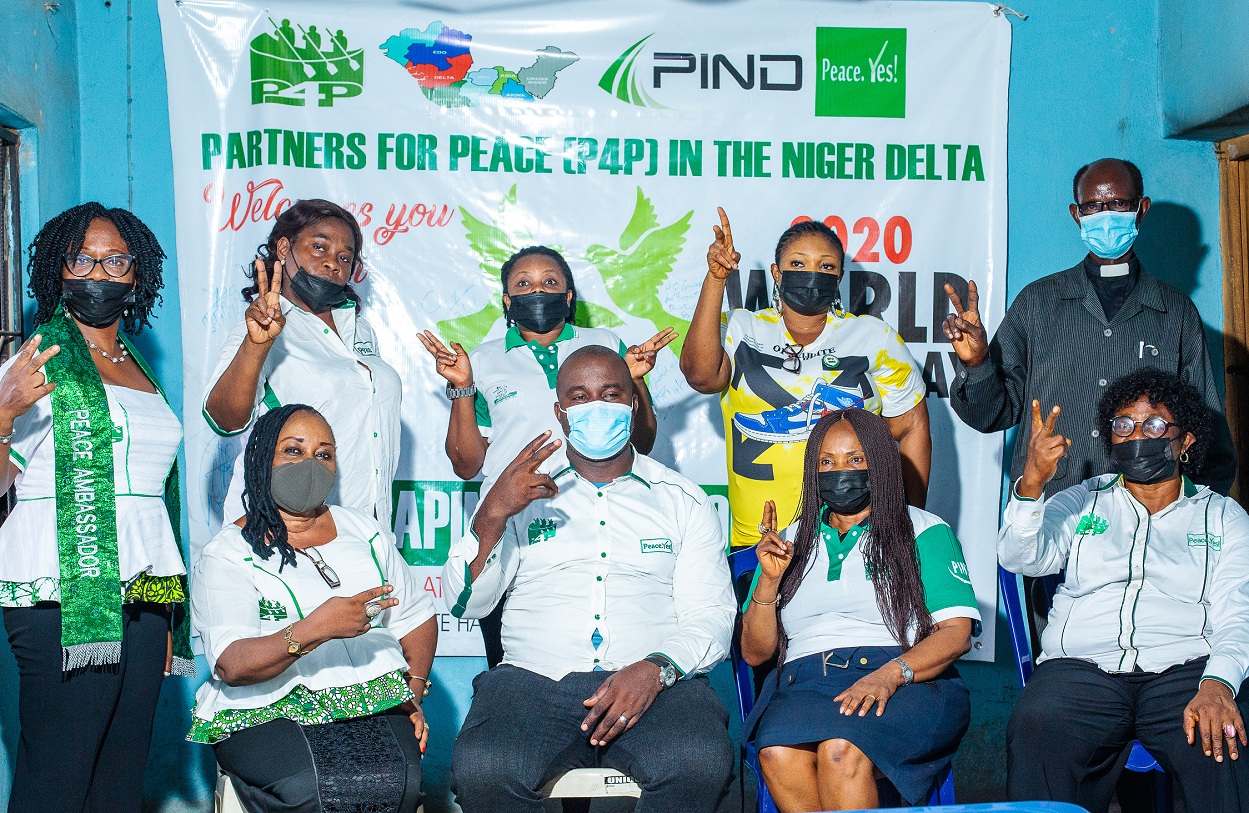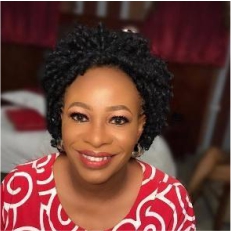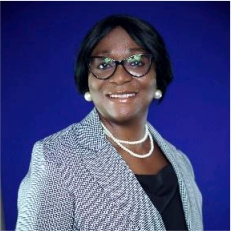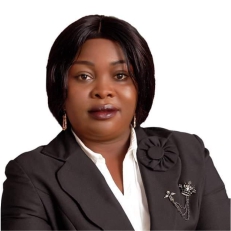At the center of PIND’s 2020-2024 strategic plan are the achievement of gender inclusivity and the empowerment of poor women, people with disabilities (PWDs), and other marginalized groups in contribution to SDG 5.
Gender Inclusivity
25,930
1,635
4,426
17,336
67
634
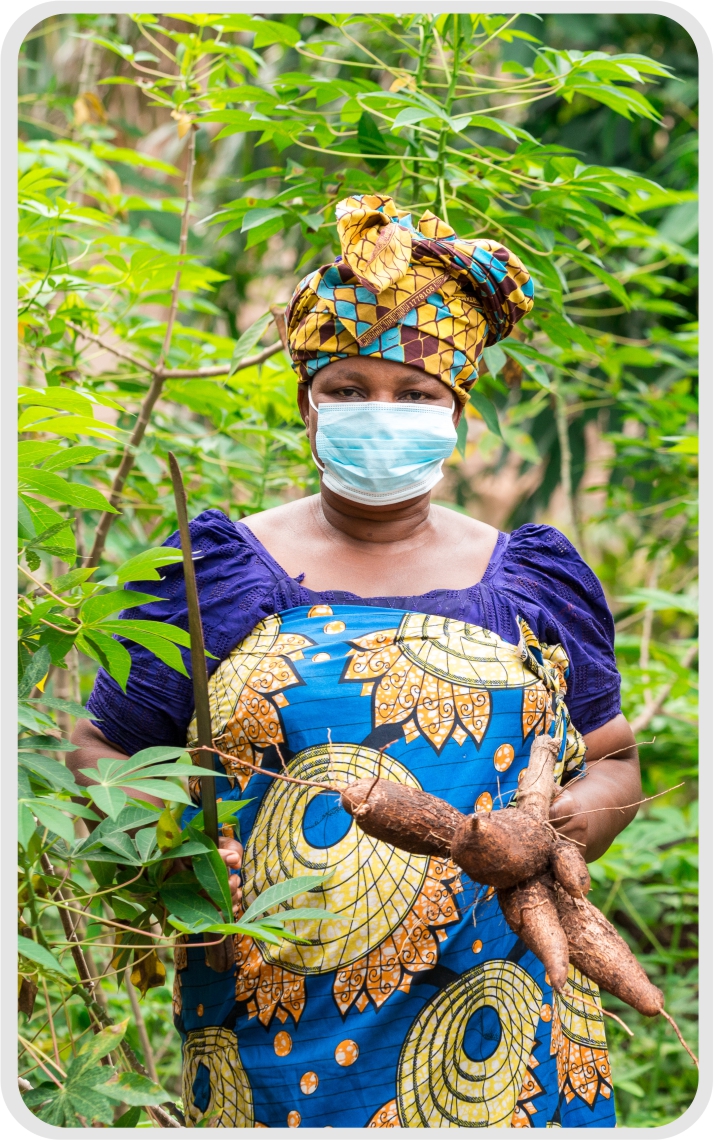
Financial Services to Unlock Credit for Woman-Owned MSMEs
Influenced by PIND, commercial BSPs adopted a tailored approach to reaching woman-owned micro, small, and medium enterprises (MSMEs) with requisite services. The BSPs supported the businesswomen who applied for loans from various financial schemes, including COVID-19 recovery funds by the government. The BSPs also improved the welfare of self-employed businesswomen by facilitating the opening of savings accounts and building their strategic business and personal finance decision-making skills. Through these efforts, PIND brought access to capital and financial services to 634 women and woman-owned MSMEs.
Focus on Funding for Coastal Community Women
One (1) of PIND’s emphasis in its 2020–2024 strategic phase is to deliver economic benefits to hard-to-reach coastal communities by facilitating job creation and income-generating activities for the people. Funds are central to achieving this, especially for women who are more disadvantaged due to restricted access to financial systems and business education. To increase these women’s chances of pursuing economic opportunities, PIND engaged ZAL and CAD Consulting, two (2) of its BSPs who trained and supported 162 and 30 women from Dodo River and KEFFES RDCs, respectively, to qualify and apply for the CBN’s AGSMEIS loan. Persistent engagement of the BSPs, PIND, and CBN officials helped advance the loan application process and secured loan disbursement approval for eight (8) women worth NGN 12.4 million; interviews and due diligence were completed for many others in readiness for final approvals. With loans secured, these women will plow more capital to start and grow their businesses and possibly create jobs for the communities.
Outreach to Improve Productivity of Women Smallholder Farmers and MSMEs
One-thousand, six-hundred, and thirty-five (1,635) women smallholder farmers and MSMEs (micro, small, and medium enterprises) received various business development services tailored to their needs and challenges. They were adapted to address the challenges related to the COVID-19 operating environment from PIND-facilitated business service providers (BSPs). These BSPs have been equipped with the right skills, tools, and connections to sustainably provide viable market solutions to farmers and MSMEs in the Niger Delta.
PIND-trained local service providers reached 25,930 women smallholder farmers and MSMEs in aquaculture, cassava, cocoa, palm oil, and poultry with information on best agricultural and business practices, adaptive techniques, smart technologies, quality inputs, and virtual tools. This information improved their KAP (knowledge, attitude, and practice), stirred additional income for them, and facilitated new jobs for women in the sectors.
Getting Young Women into Jobs and Enterprises
Setting a 40 percent target for gender and social inclusion in its NYDEP project, PIND has pushed for solid commitment among its implementing partners to adopt an inclusive approach, particularly in supporting women in male-dominated sectors. This led to young women constituting 45 percent, 36 percent, and 45 percent of trainees in the aquaculture, ICT, and finished leather sectors, respectively. Across the four (4) project sectors, this included women holding 38.5 percent of the jobs secured; 31.3 percent of the apprenticeships/ internships; and 37 percent of the enterprise positions.
Trainees in Aquaculture
Trainees in ICT
Finished Leather Sector
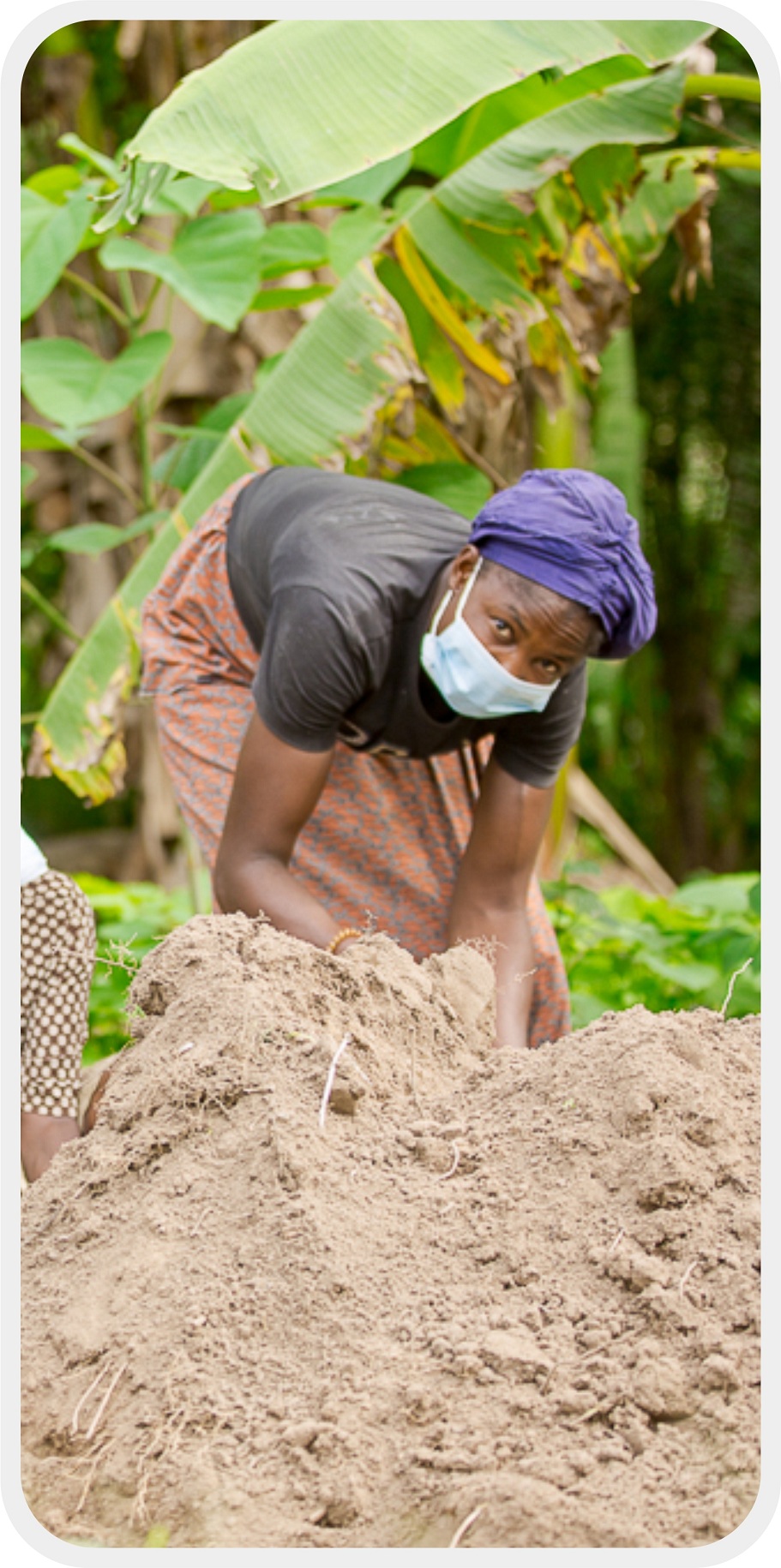
ACTIVATING WOMEN PEACE ACTORS
Under the umbrella of the P4P Network, 67 women participated in knowledge and skill-building workshops facilitated by PIND. They learnt various peacebuilding and conflict-management competencies that helped them to improve their skills as peace actors. The women also gained confidence that they could gain recognition in their communities through the professional handling of emergent conflicts.
Women Frontline Peacebuilders
Loretta Ota Ahuokpeme serves as the Deputy National Coordinator of the P4P Network in Rivers State. She has used the skills gained from the P4P Network’s workshops to train and engage more than one (1) million women on peacebuilding and cultural practices that constitute VAWG (violence against women and girls).
Delphine Chioma serves as a member of the PREVENT team of the P4P Network in Abia State, which has equipped her with vast knowledge of peacebuilding and mediation. This has made her an ardent advisor, mobilizer, and contributor to the state’s success and progress. Her role won her the Ambassador of Peace award in the state chapter in 2020.
Patience Maurice Udoh serves as the Assistant Secretary of the P4P Network in Akwa Ibom State. She has acquired skills in peacebuilding, mediation, project management, and peace advocacy to establish six (6) sub-chapters of the P4P Network in her state.
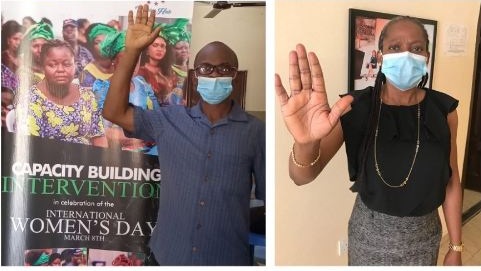
PIND joined the coalition of Development Partners Group on Gender (DPGG) from November 25 to December 10, 2020, to mark the virtual 16 Days of Activism campaign against gender-based violence (GBV) with the theme “Orange the World: Fund, Respond, Prevent, Collect,” to curb the spread of COVID-19 pandemic. PIND shared specific actions that people could take to stop GBV through local, gender-based organizations, through social media campaigns that reached over 6,500 users, and a live-radio talk show that had over 72 listener call-ins. Putting local NGO-partner organizations across the nine (9) states of the Niger Delta at the heart of our 16 Days of Activism campaign in their capacity as first-responders, PIND trained and mentored 21 CSO members via Zoom on key strategies of generating funds for campaigns to prevent and eliminate violence against women and girls in the region. The organizations also learnt how to access PIND’s free VAWG (violence against women and girls) database under the EWER platform for quality information on VAWG to design and implement GBV interventions in their respective states.
Success Snippet
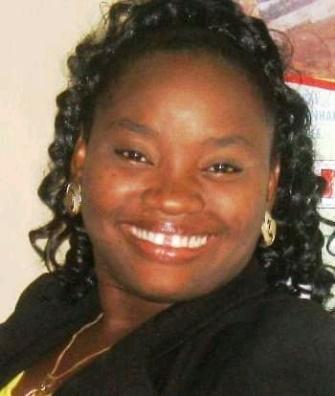 Uduak Albert of Girls Leading Africa in Cross River State applied the unorthodox resource mobilization strategy she learnt on the first day of training. After only three days of training, Uduak generated the funds to expand the content of her organization’s ongoing 16 Days of Activism campaign.
Uduak Albert of Girls Leading Africa in Cross River State applied the unorthodox resource mobilization strategy she learnt on the first day of training. After only three days of training, Uduak generated the funds to expand the content of her organization’s ongoing 16 Days of Activism campaign.
“This training was specifically designed for me. I made money for my 16 Days Activism,” Uduak said.
Addressing Gender-Labor-Market Segregation
Some labor sectors have been inaccessible to women; thereby, limiting their access to decent, fulfilling jobs and deepening gender-based poverty. The construction sector, one (1) of the growth sectors NDYEP is working in, is one (1) such sector that tends to exclude women. To enhance the gender-inclusion abilities of the NDYEP technical partners, PIND tasked them with attaining a target of 40 percent women and PWD (people with disabilities) trainees. Women trainees accounted for 21 percent of the total 40 percent, providing new career opportunities in the highly male-dominated construction sector.
Uduak’s Bold Move into Male-Dominated Construction Sector!
’My name is Uduak Etuk; I’m from Ekono Local Government Area of Akwa Ibom State. Currently, I’m a woodworker. I graduated with a Higher National Diploma (HND) in Business Administration. After my NYSC (National Youth Service Corps), I have worked for several corporate bodies as an administrator, but I never saw the satisfaction in the job, so I had to stop. Then I picked up a form to start my post-graduate diploma, but along the line, there was no money for school fee, so I paused.
Then, I came across PIND online. I got to know about NDYEP on Facebook in a post that people will be screened on several skills, and I picked interest in woodwork. I was selected. And after the screening process, we proceeded to the training, which lasted for about six (6) months. The training has built me—technically, it has built me; and mechanically, it has built me. Currently, I’ve finished the training; I’m now doing my job.
As a woman, it’s not easy to go into the construction sector. So, I had faced several challenges. A lot of people do not believe that a woman can go into woodworking. At some point, when I tell people I’m into woodworking, they’ll be like,” You’re doing a show.” But what convinces them is when they come here, and then they see me working and building things. Or, maybe, if I build and post it online, they’ll be like,” Wow, you’re just different.”
I’m now financially stable. I can say that because before now, money was hard to come by. I was not able to do the post-graduate, but this training has helped me. I have gotten my post-graduate diploma certification still in business administration. Then I have also been able to pay my house rent. I can eat three (3) square meals; at least, that’s basically what is important in Nigeria. I’m financially okay. And as a woman, I’ve been able to teach some few people online about basic things in woodwork. And I think that is nation-building. I’ve helped to impact some few youths, especially ladies.
So PIND has given me that mentality to think outside the box through the NDYEP program. I want to say thank you, PIND, for bringing this platform, this woodwork platform through NDYEP under Azure Gold Foundation, because, without you, I would have still been lying down in bed, depressed, doing nothing.’’
Championing Gender and Social Inclusion – International Women’s Day 2020
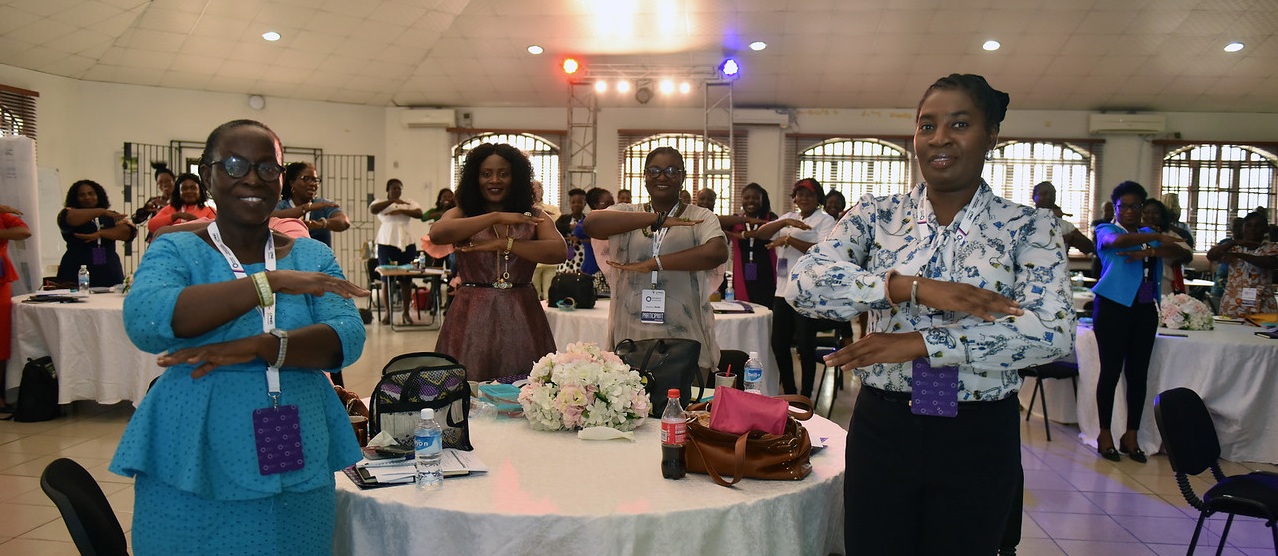
Staying true to its proud history of advocating for gender and social inclusion, PIND observed the 2020 International Women’s Day (IWD) by hosting a COVID-19-guideline-compliant workshop. This event brought together 69 individuals seeking women’s rights through tangible actions. We celebrated the women’s journey to economic equity in the sectors PIND works in, documented existing challenges hindering gender and social inclusion, and developed trackable solutions to tackling the barriers. Themed “I am Generation Equality: Realizing Women’s Rights,” the 2020 global event took stock of progress made in the 25 years since adopting the Beijing Declaration and Platform for Action.



